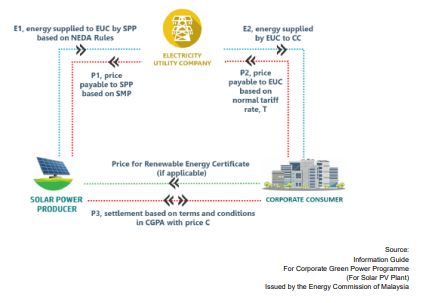Introduction
Following the teasers in the announcement by the Prime Minister of Malaysia in August 2022 and the launch of the National Energy Policy 2022 - 2040 in September 2022, the Corporate Green Power Programme ("CGPP") was finally launched by the Energy Commission of Malaysia on 7 November 2022.
The CGPP is essentially a programme which allows eligible corporate consumers ("CCs") to enter into power purchase agreements with solar power producers ("SPPs") for the purchase of renewable energy virtually instead of via direct delivery. In this structure:
- the SPP owns and operates the solar power plant and exports the energy generated from the plant to the grid/electricity utility company ("TNB");
- TNB will pay the SPP for the energy exported to the grid based on the system marginal price ("SMP"), which is the price determined by the Single Buyer based on the relevant rules and guidelines. The environmental attributes from the energy generated and sold will not pass to TNB;
- the CC will enter into an agreement, i.e. the virtual power purchase agreement ("VPPA") with the SPP, under which the CC will agree to virtually purchase the energy produced by the SPP based on an agreed price ("Fixed Price"). The SPP and the CC can agree in the VPPA that the environmental attributes for the energy purchased will be transferred to/vest in the CC.
In practice, the physical energy will still be delivered by TNB to the CC, and the CC will continue paying TNB for such energy at the prevailing market tariff - there is no change to the relationship between the CC and TNB. The arrangement, where the CC and the SPP agree that the environmental attributes for the energy purchased will be transferred to/vest in the CC, allows the CC to claim that its energy usage (equivalent to the amount contracted under the VPPA) is obtained from renewable sources;
- the settlement mechanism under the VPPA will provide that, if the Fixed Price is lower than the SMP, then CC will pay the SPP the difference; if the Fixed Price is higher than the SMP, then the SPP will pay the CC the excess.

To view the full article please click here.
The content of this article is intended to provide a general guide to the subject matter. Specialist advice should be sought about your specific circumstances.

